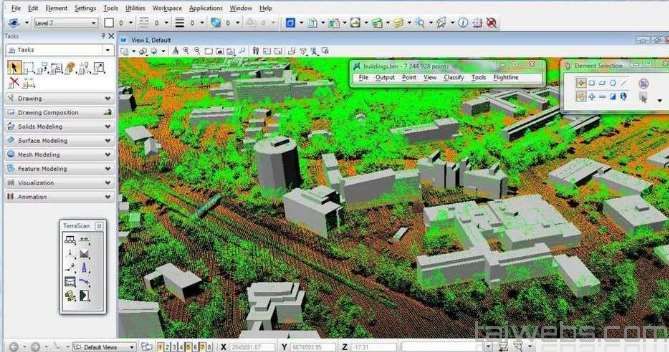Microstation Auf Mac
They work differently, and using key-in window as AutoCAD command line certainly won’t work. You can use key-in to find equal (or similar) AutoCAD tool in MicroStation during learning MicroStation. For example, you know how to draw a rectangle in AutoCAD, but you are confused which tool is equal in MicroStation. The MicroStation family of products provides traditional CAD capabilities and the power and versatility to precisely view, model, document, and visualize information-rich 2D and 3D designs of all types and scales, working for professionals in every discipline on infrastructure projects of every type. MicroStation/J was the last version to be based upon the IGDS file format; since MicroStation/J was actually Version 7, the file format became known as 'V7 DGN'. That file format had been used for about 20 years. However, with the advent of MicroStation V8 in 2001 came a new IEEE-754 based 64-bit file format, referred to as V8 DGN. MicroStation #1000. Detailed Product Information In addition to being the best 3D modeling software for projects of any size and complexity for architects and engineers, MicroStation provides all the benefits of traditional CAD software. You can produce detailed drawings.
MicroStation is a CAD software platform for two and three dimensional design and drafting, developed and sold by Bentley Systems and used in the architectural and engineering industries. It generates 2D/3D vector graphics objects and elements and includes building information modeling (BIM) features. The current version is MicroStation CONNECT Edition.
Written by Rod Wing

The Menu Bar pull downs are no longer supported in MicroStation CONNECT. Many organizations created custom pull downs for organizing workflows, hard to find tools, and custom macros/mdl’s. These can be easily added as ribbon selections. Prior to configuring MicroStation CONNECT to find your custom GUI DGNlib, open it in the MicroStation V8i (SELECTseries) Workspace > Customize dialog and copy your custom Menu Bar to either a Toolbox or User Task.
Once that is done you can then copy your GUI DGNlib to MicroStation CONNECT, then configure your custom toolboxes and menus to show up in the ribbon.
1. Open your GUI DGNlib file in MicroStation CONNECT.
2. Select File > Settings > Configuration > Customize.
3. In the Customize dialog, copy your custom toolbox to a User Task if it is not already there.
4. Close the Customize dialog.
5. In the Active Workflow drop down, select Task Navigation.
6. In the Task Selection drop down, select your custom task menu.
Your custom toolbox or former menu bar will be displayed in the ribbon
Written by Bob Mecham.Mouse functionality has been greatly expanded by the inclusion of useful tools assigned to the typical two button mouse with wheel. The wheel is now referred to as “XButton 1” and, by default, is the pan drag command. Button assignments are now stored as a file that can be saved by the user. The default name for this file is default.btnmenu.Mouse buttons are assigned as follows:
Data <D> – Used to select commands, icons, pull-down menus, etc. The data button is also used to accept or confirm a command or tentative snap.
XButton 1 <M> – Used as the pan view command in the active view.
Reset <R> – Used to release a current operation or reset a command.
Tentative <T> – Used as a tool for temporarily selecting a location or element.
Default Button Assignments for a Three-Button Mouse
Default Button Assignments for a Two-Button Mouse
Left Button “Data”
Click: Accept or identify
Shift + Click: Pan view
Microstation Auf Mac Spielen
Ctrl + Click: Continue a selection
Alt + Click: Match attributes from an element
Drag: Define a start and stop of a selection area, fence or element
Shift + Ctrl: Temporarily disable AccuSnap
Shift + Ctrl + Drag: Element selection overlap block
Double-click: Edit Text
Right button “Reset”
Click: Accept or identify
Click and Hold: Call the MicroStation context sensitive menu on the cursor
Shift + Click: Call the View pop-up control located on the cursor
Ctrl + Click: Call Main toolbar located on the cursor
Alt + Click: Call the Element quick info located on the cursor
Shift + Ctrl: Call Task Navigation toolbar located on the cursor
Wheel “XButton 1”
Click: Pan view
Microstation Auf Mac Book
Click and Hold: Pan view
Double-click: Fit view
Shift + Click: Rotate view; target is reference point (3D tool only)
Ctrl + Click: Rotate view; camera is reference point (3D tool only)
Alt + Click: Set rotate view; target is reference point (3D tool only)
Roll: Zoom in/out
Shift + Roll: Pan with zoom
Ctrl + Roll: Walk forwards/backwards
Alt + Roll: Pan left/right
Left and Right button “Chord”
Click: Tentative point


Shift + Click: Call pop-up located on the cursor
Ctrl + Click: Set AccuDraw origin
Last Month’s Tips:
Microstation Auf Mac Exe
Don’t want to miss out on other great information? Subscribe to this blog or our monthly eNewsletter now!Learn More ◊ Contact us today ◊ Newsletter ◊